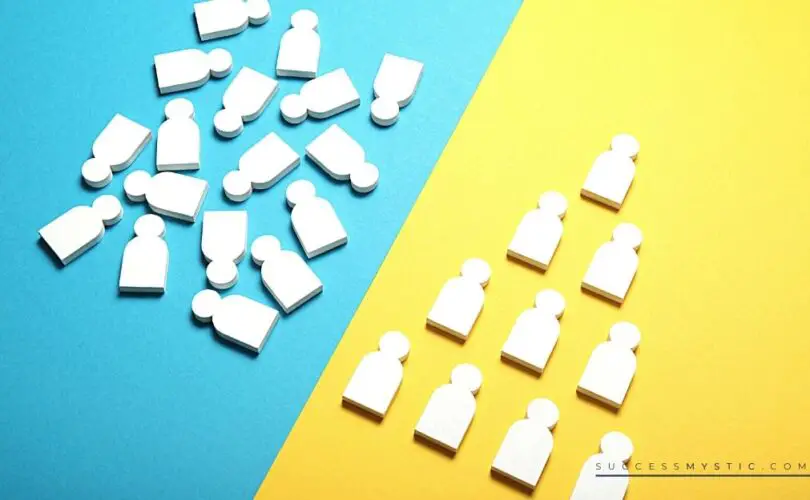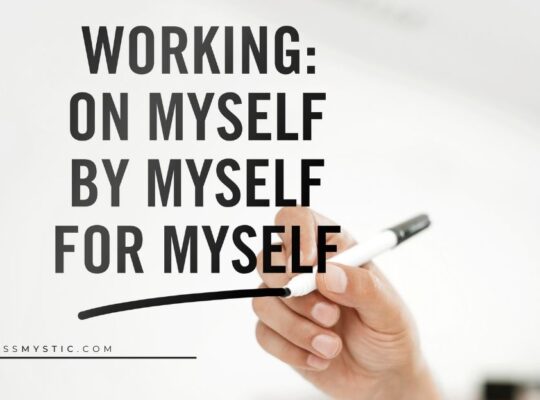Influence Versus Control
Influence.
Control.
Two words that are often used interchangeably but mean something incredibly different.
- If you want to break it down, control is about envisioning an outcome and believing that you have the complete ability to create that outcome as you picture it.
- Whereas influence is where you have envisioned an outcome and while you believe there are steps you can take to make that outcome more likely you know that are external factors that mean it’s not guaranteed.
A lot of the time, when you (or someone else) uses the word control they are likely discussing influence.
Let’s break it down with some examples.
Your body weight. It feels like something you have total control over, but you only have influence. You can take actions that make you more likely to gain weight such as being physically inactive and eating junk food, but how much weight you gain because of those actions will depend on heredity as well.
You can influence your health, quite a bit, but you cannot control your family medical history. You can take steps to reduce risk factors, but it’s not total control because nothing is guaranteed. For example, the rock stars of old who are still standing despite living a life of excess in terms of drugs and alcohol use while some people live a clean life and die young. You have influence, but you do not have control.
In terms of relationships, you have influence, but not control. You can do the work necessary to build a happy and healthy marriage (or long-term relationship), but there’s never a guarantee.
You can put the work into yourself, you can work hard to be a great partner, you can develop as a person, and your partner could still cheat on you, get tired of you, or just lose interest. It’s a terrifying thought, but it’s the reality. It’s something you have influence over, but not control.
Generally, when other people are involved in a situation you can only control you but all you have is influence over them. You can’t control their behavior or their journey. It might be frustrating, but it’s true. When you do heavily influence someone else’s life it’s very little to do with you and everything to do with the fact that they have accepted your influence.
That is true of many things. For Bill Gates, having easy access to a computer in his youth allowed him opportunities that were simply not available to others during that same time period. If you were to take a poll of those who were teens in the 1960s, the majority of them would not have had access to a computer the way Gates did (ref.).
So, very few people were as privileged to build the experience he did to use as the foundation of his business. Having a deeper understanding of influence and control, as well as their differences, is the key to leveraging your own influence and control and avoiding frustration. It doesn’t matter whether you’re dealing with exercise, business, relationships, or otherwise.
The point is that you could take all of the right steps and work as hard as you like and still not see the results you want because you haven’t yet identified what you can and can’t control and where you can and can’t influence.
That’s why it’s important that you enjoy the process and the journey rather than focusing on an end goal. Very rarely do you have total control of the outcome, but you do have control over how much you enjoy the journey.
If you enjoy whatever you’re doing, the end goal becomes less important. As you embark on whatever journey to whatever outcome you have envisioned you will see the improvements as they come and become less concerned about the outcome. You can enjoy it.
Having said that! You must be careful to ensure the pendulum doesn’t swing the other way. I don’t want you to convince yourself you have no control so you can eat whatever you want or behave in any way you like. While you may not have the control you still do have influence and it’s important to recognize how you can use that to positively change your life.
It’s easy to check out and shirk responsibility for your actions. It’s easy to hold onto a sense of entitlement and believe that the world at large owes you. That’s not the case. You cannot allow external forces to control you and you have to learn to control yourself to positively influence your life. Just because the ultimate control of the outcome doesn’t lay with you doesn’t mean you don’t have influence over the situation. It might not be easy, it might seem unfair, especially when others seem to have it easy.
However, you never know someone’s whole story and you don’t know that they do have it easier. You can only focus on yourself.
Do Not Give External Forces Power Over You
Think about this for a moment. Do you allow the circumstances of your life or the people around you to control your moods, state of mind, and life?
If your boss criticizes work you have done or says something you dislike or disagree with, how does that make you feel?
When someone cuts you off, changes lanes without indicating, or speeds by you on the freeway, how do you feel?
Does it annoy you needlessly when someone parks directly in front of your house?
Do you get frustrated, angry, or unhappy when you find yourself in similar situations? Do you then spend the day thinking about the situation or incident?
These are the types of situations that arise on a daily basis. Think about how much time you waste each day thinking about your annoying boss, the jerk who jumped the line in the coffee shop, or even a stray comment someone made years ago. What good does it serve in your life? None. If anything, it leaves you unfocused, unproductive, and inefficient everywhere you go.
We are too quick to allow others to control (or simply influence) our lives, moods, and state of mind. It happens with strangers in the supermarket, it happens with family at home, and colleagues in the workplace. You can’t have control over every situation and often, you don’t have influence. That’s just life. You can’t control the words someone else uses, you can’t control the behavior of others, you can only control how you react.
You can’t control everything that happens to you, you can only control how you act or react, both mentally and emotionally. You choose your behavior, you choose your actions, you choose your reactions, and you can learn to remain unaffected and detached from the things you have no control over.
How do you avoid anger? How do you stop dwelling on pain and hurt? How do you avoid negative reactions? How do you stop taking everything so personally? How do you climb down off the puppet string that others hold over you? How do you stop others from pulling your strings or pushing your buttons?
There are a variety of ways you can tackle this problem. It’s easy to say just stop letting external forces control you. It’s easy to say control yourself and surround yourself with the positive influences you can learn from. What does that even look like?
This is going to be a journey. Because when you find yourself in a situation like any of those described above, you have to actively decide to loosen the effects of other’s grips on you. A few of the most simple ways to do so is through deep breathing on the spot before you open your mouth to respond.
Another would be to combat the negative thoughts spiraling through your mind with positive ones. Or, to simply walk away and give yourself time to relax your body. These are the types of tools that are useful in situations where you feel your emotions mounting.
However, when you are overcome with emotions it isn’t easy to do. You might be dealing with emotions so strong that you don’t remember to breathe. You may be so angry that you simply can’t remember to walk away. You may be so frustrated you cannot combat negative thoughts with positive ones.
Emotional detachment is an effective tool. However, it takes a bit of learning and a lot of practice. However, it can change your life. When you find yourself in difficult situations emotional detachment can help you get through it and the more frequently you practice it the quicker it will become second nature. You can stop worrying about others pulling your strings and focus on building your inner strength, increasing focus, and controlling yourself, and using your influence elsewhere.
It will protect you from overreacting to external situations or being upset by external factors or conditions. It will not change the circumstances you face. However, it will help you act, react, and deal with things calmly, without agitation, and with common sense. Often, strong emotions cloud judgment and waste your energy.
How To Practice Emotional Detachment
Learn To Let Go
I know, that’s easier said than done, but it really is a powerful tool. Can you think of a person or situation that you have tried your best to control? You wouldn’t be human if you couldn’t come up with at least one. How does it feel when you try to control the uncontrollable? It’s stressful. It’s frustrating. It’s exhausting!
When you focus all of your energy and attention on controlling the uncontrollable, you’re missing out on what you can influence. You control you. You control your words. You control your thoughts.
You control your actions. That’s it.
You cannot control anything else so you have to learn to let go! If anything, you may be able to exert a bit of influence, but even then, you rarely have total control over the outcome. Focus on what you can control and you’ll feel a lot less stressed.
Observe
By observing your feelings and thoughts you can detach from the unwanted ones. This is something you can practice anytime and anywhere. You need only cast your gaze inward and consider the reactions, feelings, and thoughts passing through your mind and what kind of response they garner from you. Which brings us to the next action you can take.
Substitute Thoughts
When you have a negative thought, then replace it with a positive thought. When you have a fear, replace it with something you feel confident about. When you have a worry, take a moment of mindfulness. Your thoughts can influence your mood and actions so you have to take control over your thoughts, a thing which you do have control over.
Loosen
Are there unpleasant memories you hold onto? Is there a negative experience that sticks with you? If so, there’s a very good chance you’re still holding onto the negative emotions that the experience or situation triggered within you. When you deal with a similar issue then those unpleasant emotions arise. When you face a person similar to someone who hurt you, you’re taken back to that pain. You have to learn to loosen the attachment you have to these painful memories and emotions from your past.
Avoid
We all have toxic people in our lives. And, unfortunately, you can’t control them. However, you can limit their influence in your life. As best you can, avoid the people who constantly let you down, criticize you unjustly, or just downright depress you.
You can also work on your own reaction to them and their behavior. Have mental tactics ready to mitigate the impact they have on you. The rest of the time? Do your best to avoid them altogether.
Control Your Self And Learn From Positive Influences
Something I think we can all agree on is that we tend to focus on what we know best. We pursue what we believe to be our mission, that’s the key to wealth, health, and success, isn’t it? What we don’t focus on, however, is the need to control ourselves and learn from positive influences. By that, I mean self-control.
Self-control is your capacity to override impulses and respond more appropriately. It’s your self-control that has you eating regular meals instead of bakery goods at every meal. It’s your self-control that ensures you forgive someone you love rather than freaking out and tearing them down. It’s when you stop what you’re doing and pay attention to someone who is speaking to you instead of splitting your attention. As you can see from the examples, you likely have some form of self-control, but perhaps not a high level of it.
A high level of self-control can help you manage conflicts. More to the point, a motivational conflict. This is when your motivation clashes and prevents you from taking action. The majority of your motivations benefit you.
Such as your motivation to eat to live, to sleep for rest, to drink to remain hydrated. They usually aim to protect you from harm and fulfill your needs. Self-control stops you from engaging in those negative behaviors you feel motivated to do. Whether it’s reaching for a bottle to relieve stress or engaging in other potentially dangerous or risky behaviors.
Self-control can also prevent you from engaging in the wrong basic motivations, such as encouraging you to make a healthy choice when it comes to diet as opposed to a dozen donuts.
Monitoring is a way for you to keep track of your actions, thoughts, and feelings. A university study found that female freshman college who weighed themselves daily prevented the typical Freshman 15 weight gain that the students who did not weigh themselves experienced (Frequent Self-Weighing, Levitsky, et al). Likewise, keeping a budget and tracking your spending will help you maintain healthy finances. These are standards we set that help us steer ourselves to our desired response. Such as the speed limit that provided you follow it, it prevents you from getting a speeding ticket.
Or paying your taxes to avoid the IRS chasing you down. It’s all a set of rules that we live by and as long as you do not break the rules you will not face the consequences. You have your own set of personal standards and those standards govern your behavior.
For example, a devout Muslim or a practicing Jew will not eat pork or any product from the pig because their religious beliefs tell them not to. Seventh Day Adventists are often vegetarians because of their belief system. Certain evangelical Christians refuse both pork and shellfish because of the edicts of the Old Testament.
Because of those beliefs, they believe it’s inappropriate to consume those particular items so they do not. Likewise, because of your personal standards or guidelines, you may feel certain thoughts or emotions are inappropriate so you exert your self-control to avoid them.
What on earth does that have to do with this self-control and controlling yourself? Well, a lot of your standards may be from you, but some are from society and the wider culture. That might make it more difficult to control.
You’re letting external forces control you. You need the strength to control certain impulses and you need the energy to focus on what you can control and influence. There are numerous factors that affect this, such as stress, physical fatigue, and mental exhaustion.
So, self-control boils down to monitoring, standards, and strength. You need all three of these things to work together. While you may know what you need to do and you might even have the strength to do it, you will struggle to achieve it if you do not monitor your progress.
Likewise, without standards, what are you doing? Without strength, you might know your standards, you might monitor things, but without the strength to do where will you go? All three are necessary to maintain self-control.
If self-control is something that you struggle with, you’re not alone. It’s something all of us struggle with from time to time, especially when we allow external forces to exert their control over us and derail us from our journey. But self-control can improve your life in a variety of ways. I’d like to touch on three of the biggest ways.
How Self Control Can Improve Your Life
1| Well-being
The more self-control you have the healthier you will be. You are more likely to sleep better, you eat better, exercise more often, experience less illness, and generally have better mental health. Your level of self-control is also related to anxiety and depression. Which makes perfect sense when you consider how much of your anxiety revolves around a distinct feeling that you have no control in a situation.
The negative impulses related to substance abuse, emotional eating, smoking, and other vices are less present in people who own their standards and exert self-control on the matters that mean something to them.
Notice the caveat. When your self-control is based on your standards. If you allow external forces to control and guide you, you might appear to others to have a strong sense of self-control, but it isn’t serving you it’s serving others. That means you’re more likely to experience anxiety, depression, and you may be more likely to fuel negative impulses.
2| Relationships
Everyone wants to be with someone with a strong measure of self-control because people don’t want to have to do all the work. No one wants to be with someone they can’t trust. No one wants to be around someone who doesn’t follow through. No one wants to be around someone who gives in to their impulses, lashes out, or crumbles at the sight of a stressful situation. People with self-control are forgiving.
People with self-control deal with conflict benevolently rather than violently. People with self-control are more enjoyable to be around and find it easier to build trusting relationships, whether romantic, platonic, familial, or in the workplace. Learning to control yourself, learn from positive influences, and ignoring the external forces that want to control you are going to help you build stronger relationships.
3| Society
What does society have to do with anything? Well, the more people with self-control in the world, the more people who let their internal force guide them rather than external forces control them, the better the society we live in will be. With more self-control, you are likely to earn more money because you’re a more trustworthy recruit which leads you to be a more generous person.
People who learn to control themselves and take their cue from positive influences can override selfish impulses to serve the greater good. And, on a broader level when we have clear standards, we build better societies.
I’d ask you to consider how self-control influences you, your relationships, your well-being, as well as societal well-being.
4 Ways To Increase Self-Control
Interestingly, in a study from Duckworth and Seligman, they found that self-control had more to do with grade point average than IQ. In fact, self-control was more than twice as important in dictating GPA as intelligence (ref.).
So, students with high levels of self-control outperformed those with higher IQ scores. IQ doesn’t change. It doesn’t move. But what you do control is your self-control!
If you want to improve performance, then you can focus on self-control to improve performance. But first, you must improve self-control, and here is how.
1| Account For Your Mental Energy
Do you plan how you spend your time? There’s a good chance you do so. But do you plan how you spend your energy? More important, your self-control energy? I want you to consider how you spend your time and how much self-control energy you use for the tasks you do.
More importantly, consider the amount of energy you use for all of the other things you do, the things other people expect of you, or the external forces want you to do. It’s about being more mindful about how you use your energy and how you apply your self-control.
2| Build Your Strength
Your self-control relies on your energy resources. To strengthen self-control, you must exercise your self-control. It might sound silly, but tasks like using your non-dominant hand to brush your teeth, or clean, or do other mundane tasks requires a measure of self-control and can help you build your self-control strength.
Specifically, if you commit to doing so for a full week, then sticking to it for the entire week is an excellent exercise in self-control and building it.
3| Battling Your Environment
People with high levels of self-control can take control of their environment. For example, if you are highly motivated to lose weight and you possess high levels of self-control, then you will ensure there is no temptation in your home. You will simply not keep junk food in your home. You are driven to succeed.
If you have a plan to write 1,500 words each day, then you will find a way to block out all distractions to ensure that you write at least 1,500 words each day. You can’t control external forces, but you can control your direct environment and influence your greater environment to ensure that you learn from positive influences.
Think about how you can change your environment to achieve a certain goal. Make that change for a few days and see how it changed things for you.
4| Battling Yourself
Ultimately, the biggest battle you may fight is the one against yourself. You have to remove your mind from the equation. What? You make a mental contract with yourself to do a thing.
For example, you want to read more so you say when I get home from work, I am going to sit down and read at least one chapter of the book. That’s it, the decision-making process is over. You know exactly when you’re going to read and you simply have to follow through.
So, there is a manner of different ways in which you can build your self-control. There are positive influences all around you and it’s up to you to choose them to learn from versus allowing external forces to control you.
Final Thoughts
Learn what you can control and change and make those changes. If you can’t change it, control it, or influence it then change yourself and learn to live with it. You can control your attitude when it comes to the uncontrollable. Make peace with what you can’t control because worrying about things you have no control over is like digging a hole and dropping the dirt back in the hole.
You won’t get anywhere by dragging up the past, whether it’s someone else’s or your own. You can learn from the past, but you can’t get caught up on why it was bad. You live in the present moment and your future hinges on your ability to be present for it. Enjoy the day that’s unfolding around you.
There’s always a distraction, there’s a bunny trail around every corner. Stop wasting your energy (emotional, physical, and otherwise) on trivial nonsense. It’s not going to get you anywhere and it’s just keeping you trapped where you are and robbing you of your control.
Take action and invest in yourself. It might seem like a selfish act, but you can’t take care of anyone else if you aren’t taking care of yourself. Self-investment should mean focusing solely on building your self-control, it could mean saving money each month, or simply focusing on personal development. Ultimately, by investing in yourself you facilitate your ability to invest in others.
Finally, don’t be scared to seek feedback. That might seem contradictory, but feedback isn’t about allowing external forces to control you. Rather, it’s about making yourself an open book. Feedback is an exercise in self-awareness. It’s about learning as much as you can about yourself by getting insight into how others perceive you.
People are attracted to transparency. Moreover, one of life’s greatest challenges is exerting influence and maintaining self-control in a world where everyone seeks to control you. Getting regular feedback allows you to see how others perceive you and it allows you to check in on just how well you exercise your self-control. Don’t underestimate the power of feedback.
The only person responsible for your happiness is you. Likewise, the only person you can control is you. We often believe that our happiness can be found in external sources, just like we often allow external forces to control us. You can’t pin your hopes of happiness on one person. Nor can you pin your hopes of success and well-being on the external forces in your life.
You have very little control over anything in this life, you can only apply your influence in many situations. It’s important to remember that. However, it’s even more important to remember that the only control you truly have is over you and look around yourself, there are positive influences everywhere. Isn’t it time you took those positive influences and learned self-control to become one of those positive influences yourself?







